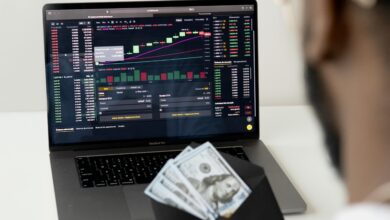Mind Over Money: Navigating the Emotional Landscape of Trading Decisions

In the high-stakes world of trading, where fortunes can be made or lost in the blink of an eye, the psychological landscape is as crucial as the financial data that drives market movements. While many traders focus on technical analysis, market trends, and economic indicators, an equally important factor often goes overlooked: emotions. The psychology of trading delves into how feelings such as fear, greed, and anxiety can significantly influence decision-making processes, affecting outcomes in ways that are not always rational or predictable.
This article explores the intricate relationship between emotions and trading behavior, starting with an examination of the emotional triggers that shape traders' choices. We will then navigate the tumultuous waters of fear and greed, two powerful forces that can propel markets and individual traders into unpredictable territory. Finally, we will offer practical strategies for mastering the mindset, empowering traders to regulate their emotions and enhance their decision-making capabilities. By understanding the psychological underpinnings of trading, individuals can cultivate a more disciplined approach, ultimately leading to greater success in the financial arena.
- understanding-emotional-triggers:-the-psychological-factors-influencing-traders’-decisions“>
1. Understanding Emotional Triggers: The Psychological Factors Influencing Traders' Decisions
Emotions play a pivotal role in the decision-making processes of traders, often dictating their actions more than rational analysis. Understanding emotional triggers is essential for grasping how psychological factors influence trading decisions.
One of the primary emotional triggers for traders is fear, which can manifest in various forms, such as the fear of loss, fear of missing out (FOMO), and even fear of being wrong. The fear of losing capital can lead to overly cautious behavior, resulting in missed opportunities or premature exits from potentially profitable trades. Conversely, FOMO can drive traders to enter positions impulsively, often leading to poor outcomes because they succumb to the pressure of wanting to capitalize on a perceived market opportunity.
Another significant emotional trigger is greed, which can cloud judgment and lead to overtrading or holding onto positions for too long in the hope of maximizing profits. Greed often blinds traders to warning signs that indicate it may be time to take profits or cut losses, causing them to ignore established trading strategies and risk management practices.
Hope and regret also play critical roles in trading psychology. Traders may hold onto losing positions due to the hope that the market will turn in their favor, despite evidence to the contrary. This behavior can result in significant financial losses, as traders cling to their initial expectations rather than adapting to changing market conditions. Regret, on the other hand, can lead to cautiousness or a reluctance to take risks after experiencing a significant loss, hampering future trading performance and preventing traders from seizing new opportunities.
Additionally, the social aspect of trading cannot be overlooked. Traders often find themselves influenced by the opinions and actions of others, particularly in the age of social media and online trading communities. This can amplify emotional triggers, as traders may feel pressured to conform to group sentiment or react to market buzz, leading to impulsive decisions that may not align with their individual trading strategies.
In summary, understanding these emotional triggers is crucial for traders seeking to enhance their decision-making processes. By recognizing and managing their emotions, traders can develop a more disciplined approach, adhere to their trading plans, and ultimately improve their performance in the markets.
Emotions play a pivotal role in the decision-making process of traders, often leading to outcomes that deviate significantly from rational analysis. The field of behavioral finance highlights how psychological factors can influence financial decisions, revealing that humans are not always the rational actors traditional economic theories assume them to be.
One of the most prominent emotions affecting traders is fear. When markets decline, the fear of losing money can trigger panic selling, resulting in a snowball effect that exacerbates market downturns. This reaction is often driven by the fear of regret, where traders anticipate the emotional pain associated with making a wrong decision. Conversely, during bull markets, overconfidence can set in, leading traders to underestimate risks and overextend their positions based on the euphoria of rising prices.
Another key emotion is greed, which can cloud judgment and lead to impulsive trading decisions. Traders may hold onto losing positions, hoping for a turnaround, or chase after rallies without conducting thorough analysis, driven by the belief that they can capitalize on the market's momentum. This behavior often results in the “herd mentality,” where individuals follow the crowd rather than relying on their own analysis, further amplifying market volatility.
Moreover, cognitive biases, such as confirmation bias and loss aversion, significantly shape trading behaviors. Confirmation bias leads traders to seek information that supports their existing beliefs while ignoring contrary evidence, which can result in poor decision-making. Loss aversion, on the other hand, makes individuals more sensitive to losses than to equivalent gains, prompting them to take excessive risks to avoid realizing losses.
The impact of these emotions and biases highlights the importance of developing emotional intelligence and self-awareness in trading. Successful traders often implement strategies to manage their emotional responses, such as setting clear rules for entry and exit points, maintaining a trading journal to reflect on past decisions, and utilizing techniques like mindfulness to stay grounded during times of market volatility. By acknowledging and addressing the psychological aspects of trading, individuals can make more informed decisions and improve their overall trading performance.





